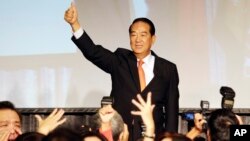Taiwan’s ruling political party, which is known for its conciliatory stance toward old rival China, is lagging in the polls ahead of January’s presidential election. Now the party’s candidate faces a new threat as a third contender who also favors friendly ties with Beijing stands to take away votes.
When Taiwan’s ruling Nationalist Party nominated as its candidate for president, she was already behind in opinion surveys. Her party had lost support last year as youth groups protested the government’s economic ties with China, where communist officials still claim sovereignty over Taiwan despite decades of self-rule. Now a third candidate, James Soong, is expected to erode her already fragile support.
Soong, who is 73 years old, was a provincial governor and director-general of the Government Information Office before 2000. He ran for president in 2000 and 2012. Like Hung, he advocates closer ties between Taiwan and China. Lai I-chung, vice president of Taiwan Think Tank in Taipei, said the Nationalists – also known as the Kuomintang, or KMT -- are afraid that Soong with his similar views on China will take away votes.
“Right now you are looking at the Kuomintang trying to fire all kinds of shots to imply that James Soong is not number two, James Soong is number three. What the KMT was doing is to prevent that strategic voting that abandons Hung Hsiu-chu in favor of James Soong. So that actually alone speaks volumes about how the KMT is fearing of James Soong,” said Lai.
Soong split the vote in 2000 when he ran against the Nationalist Party’s Lien Chan and placed second. The split put the opposition Democratic Progressive Party’s Chen Shui-bian in power. Over the next eight years, Chen advocated Taiwan’s independence from China, enraging Beijing and irritating Washington. This year’s presidential race frontrunner Tsai Ing-wen is chair of the same party, but said she is open to dialogue with China as long as the two sides are not cast as a single country.
Joseph Wu, the opposition party’s secretary-general, said the third candidate will hurt only the Nationalists.
“Dr. Tsai’s support remains very strong. Our lead in the public opinion surveys is substantial. Hung’s support is already very low, so any number taken out of her is going to make her even more unlikely to be elected,” said Wu.
A loss for the Nationalists would raise tensions again between Taiwan and China. Under current Nationalist President Ma Ying-jeou since 2008, the two sides set aside political disputes to open a first-ever high-level dialogue that has led to a series of economic agreements. The president says Taiwan needs help from China’s massive economy to ensure its own prosperity.
China has claimed sovereignty over Taiwan since the Chinese civil war of the 1940s and demands eventual unification. Polls indicate Taiwanese people prefer today’s degree of autonomy. Some worry that China will use economic links to push Taiwan toward unification.
Political observers say Soong is running for office largely to focus attention on his small People First Party and ensure it retains a minimum number of seats in parliament.
Nathan Liu, an international affairs and diplomacy professor at Ming Chuan University in Taiwan, said some older voters consider Soong a capable leader based on his record before 2000. Hung is a veteran legislator, but she has not served in the government. But Liu says the third candidate’s advocacy of closer China ties will kill any chance of taking votes from the main opposition party.
“The influence Soong inflicts will be on Hung’s camp. Hung hasn’t shown her ability to do anything. She has been a legislator for all her life, never had any opportunity to run any organization, not to mention government,” said Liu.
Early opinion polls indicate Soong would get at least 10 percent of the vote in the January 16 election. Before he announced his candidacy on August 6, voter surveys indicated the Nationalist candidate was already lagging behind the opposition party’s frontrunner by about 20 percentage points.




